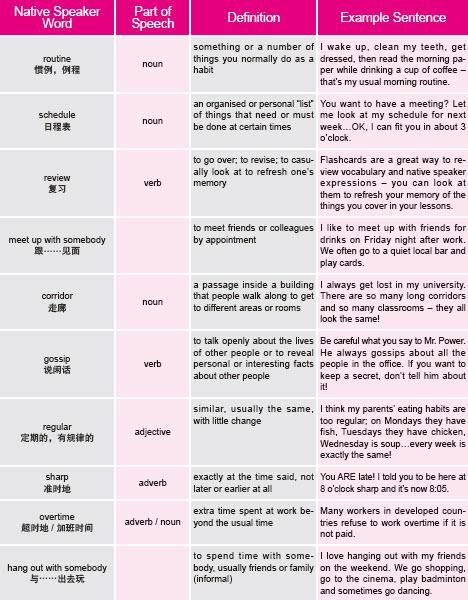Formula 2: What do you usually / normally do?
AIMS 学习目标
In this lesson you'll master the Formula for
"What do you usually / normally do ?" type questions.
本课的高分公式将教会你如何回答下列同类型的问题,比如:
• What do you do on an average day?
• What is your normal daily routine?
• Can you describe your typical day?
• What do you usually do on weekends?
THE FORMULA 高分公式
When the examiner asks you "What do you usually / normally do ?" type questions, you must:
Answer Order
• Say what you do at the time the examiner asks you about.
• Say how often you do these things.
Language Steps
1.Use adverbs of frequency like a native speaker to show how frequently, or infrequently, you do things. ("I often meet up with my classmates." / "I sometimes go shopping.")
2.Use the present tense & times of day correctly for general habits. ("I ride my bike every day at 2 o'clock." / "We have dinner together in the evening .")
3.Show that you can use one or two common sequence markers. ("Before class starts we talk." / "We then go to bed.")
NATIVE SPEAKER WORDS 英语母语词汇

Answer Order
• Say what you do at the time the examiner asks you about.
• Say how often you do these things.
Language Steps
1.Use adverbs of frequency like a native speaker to show how frequently, or infrequently, you do things. ("I often meet up with my classmates." / "I sometimes go shopping.")
2.Use the present tense & times of day correctly for general habits. ("I ride my bike every day at 2 o'clock." / "We have dinner together in the evening .")
3.Show that you can use one or two common sequence markers. ("Before class starts we talk." / "We then go to bed.")
NATIVE SPEAKER WORDS 英语母语词汇
让我们来学习一些英语母语词汇,这些词汇对于回答该类型的问题非常有用,并且能够帮助你理解下面的答案范例。阅读雅思考生Alice和David的参考答案。
MODEL ANSWERS 答案范例
阅读雅思考生Alice和David的参考答案。
Interviewer Tell me about your usual daily routine.
Alice Well, usually I wake up around 8 a.m. I always have a cup of coffee while I review my study notes over breakfast. Then I normally ride my bike to school, apart from in winter, when it's way too cold. Before class starts I often meet up with my classmates in the corridor and we gossip a bit about life and school. After school, I always go straight home and then start on my homework while my mum cooks me dinner. I usually go to bed at about 10 p.m.
Interviewer Do you do the same thing at the same time every day?
David During the week, I have a very regular schedule because of my job. I always wake up just after 7 in the morning, then eat my breakfast on the way to the subway station. I get to work at 8 o'clock sharp, and usually work until 5, sometimes I work overtime until 7 or 8. After I get home I normally eat dinner with my wife and after that either hang out with friends or watch TV before going to bed at about 11.
LANGUAGE STEP 1 Adverbs of Frequency 高分语言点1 频率副词
让我们来看一下雅思考生Alice和David是如何使用频率副词的。
Alice Well, usually I wake up around 8 a.m. I always have a cup of coffee while I review my study notes over breakfast. Then I normally ride my bike to school, apart from in winter, when it's way too cold. Before class starts I often meet up with my classmates in the corridor and we gossip a bit about life and school. After school, I always go straight home and then start on my homework while my mum cooks me dinner. I usually go to bed at about 10 p.m.
David …I always wake up just after 7 in the morning, then eat my breakfast on the way to the subway station. I get to work at 8 o'clock sharp, and usually work until 5, sometimes I work overtime until 7 or 8. After I get home I normally eat dinner with my wife…
You must use adverbs of frequency well in your test, and if you can master using a variety of different adverbs of frequency it will make your English more interesting and much more like a native speaker.
Let's look at two different kinds of adverbs of frequency .
Adverbs that go after the subject and before the verb
• always
"I always go out partying every night when I'm on holiday."
• often
"She often goes running after class."
• never
"She never rides her bike in winter."
• almost never
"We almost never go out dancing."
• rarely
"He rarely eats rice."
• hardly ever
"She hardly ever exercises."
Adverbs that can go before or after the subject
• usually
" Usually I wake up around 8 a.m."
"I usually ride my bike to school…"
• normally
" Normally I help my mum with the cooking."
"I normally help my mum with the cooking."
• sometimes
"We sometimes go shopping…"
" Sometimes we go shopping…"
小贴士
almost never, hardly ever和rarely这三个词语表达的意思相同。
Exercise 2.1: Word Order
Rewrite the sentences below in the correct order.
1.eat I buns steamed usually
____________________
2.never I almost exercise do
____________________
3.gets hardly ever home early he
____________________
4.she novels never reads
____________________
5.always my bike rides a father
____________________
6.lunch read magazine during I a sometimes
____________________
7.I parents with watch my TV normally
____________________
8.play I computer rarely games
____________________
9.weekend cycling often the go on I
____________________
LANGUAGE STEP 2 The Present Simple & Times of Day 高分语言点2 一般现在时和时间的表达方法
让我们再来回顾一下Alice和David的答案,看看他们是如何使用一般现在时的。
Alice Well, usually I wake up around 8 a.m. I always have a cup of coffee while I review my study notes over breakfast . Then I normally ride my bike to school, apart from in winter, when it's way too cold. Before class starts I often meet up with my classmates in the corridor and we gossip a bit about life and school. After school, I always go straight home and then start on my homework while my mum cooks me dinner. I usually go to bed at about 10 p.m. …
David During the week, I have a very regular schedule because of my job. I always wake up just after 7 in the morning , then eat my breakfast on the way to the subway station. I get to work at 8 o'clock sharp , and usually work until 5, sometimes I work overtime until 7 or 8. After I get home I normally eat dinner with my wife and after that either hang out with friends or watch TV before going to bed at about 11.
The present simple is used to describe what we do every day or very frequently:
"I get up at 7:30 in the morning."
"She often goes to the movies."
"They eat noodles for lunch."
小贴士
不要以为一般现在时的使用非常简单,很多英语水平不错的学生往往因为简单的时态错误而失分!
The present simple is often used together with times of day , so make sure you are aware of the following:
• at+hour+o'clock
"My mum makes me go to bed at 10 o'clock ."
"I get up at 6 o'clock ."
• at+dawn / noon / midnight
"I never get up at dawn. "
"I always eat lunch at noon. "
• at+hour+a.m. / in the morning
"I usually wake up at 8 a.m. "
"I usually wake up at 8 in the morning. "
• at+hour+p.m. / in the afternoon / evening
"My father often comes home at 9 p.m. "
"My father often comes home at 9 in the evening. "
• at / on the weekend
"I normally just relax at the weekend. "
"I normally just relax on the weekend. "
小贴士
掌握正确的时间表达方法很重要,千万不要犯雅思考生中常见的错误,比如at 8 a.m. o'clock, in noon, on weekend !
在英语中,我们通常只用数字1—12来表达时间,而不使用24小时制。因此,23:00我们可以说11 o'clock或者11 p.m.,但是我们不能说23 o'clock。
Exercise 2.2: Gap Fill
Write the words below in the correct spaces.
eat go out hang out with have lie
meet up play wake up watch watch
Recently I've been very lazy. I_____ pretty late, around 10 a.m., and take a long time over breakfast. I usually _____ television while I _____ my breakfast, then I _____, _____ with friends and _____ football in the street. I go back home and _____ lunch with my family, then I go out again in the evening and _____ my mates. After that I normally _____ in bed till the early hours of the morning and _____ movies.
Exercise 2.3: Error Correction
Identify the mistakes in the following sentences and write the correct sentences in the spaces provided.
1.I often go to my sister's house for lunch in the weekend.
____________________
2.On holiday, I usually get up 4 p.m. in the morning.
____________________
3.I always go for a jog on the evening, when it is cool.
____________________
4.Normally, I go to bed at 11 p.m. o'clock.
____________________
5.I try to have lunch in noon.
____________________
6.I leave for work on 6 a.m. o'clock.
____________________
EXTRA LANGUAGE POINT Sequence Markers 补充语言点次序标志词
首先,让我们来看一下雅思考生Alice和David是如何使用序号标志词的。
Alice Well, usually I wake up around 8 a.m…. Then I normally ride my bike to school, apart from in winter, when it's way too cold. Before class starts I often meet up with my classmates in the corridor and we gossip a bit about life and school. After school, I always go straight home and then start on my homework while my mum cooks me dinner…
David …I always wake up just after 7 in the morning, then eat my breakfast on the way to the subway station… After I get home I normally eat dinner with my wife and after that either hang out with friends or watch TV before going to bed at about 11.
To talk about your usual or normal routine, you should use sequence markers . These help you logically link the different activities that you do together and also make things much clearer for the listener.
Remind yourself of the following sequence markers :
• before
• then
• after (activity)
• after that
小贴士
Alice和David并没有在他们做的每件事情后都说then或者after that。他们只是用了一些次序标志词——这就足以使他们听起来像英语母语者。
Exercise 2.4: Gap Fill & Ordering
Write the words below in the correct spaces and then order the sentences 1-4 in the order that they occur.
after the shower after that before then
A._____ I have something to eat. I rarely have a very big breakfast.
B._____, I come home and take a quick shower.
C.On Sundays I normally get up fairly early and have a run in the local park_____ doing anything else.
D._____ I throw some really comfortable clothes on.


